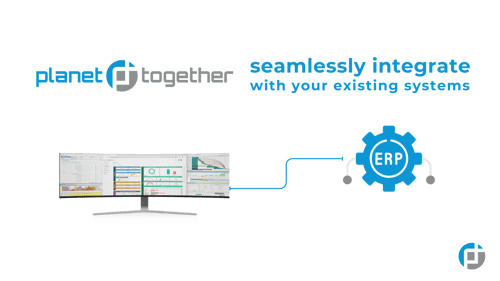Big Data Analytics for Production Scheduling: Unlocking Plant Efficiency in Pharmaceutical Manufacturing
In the fast-evolving world of pharmaceutical manufacturing, Plant Managers face an unprecedented challenge: balancing regulatory compliance, increasing demand variability, and the need for operational efficiency. Production scheduling—once a routine task—is now a dynamic, data-driven puzzle that demands speed, precision, and agility.
This is where Big Data analytics steps in, transforming production scheduling from a reactive, manual process into a strategic, insight-driven advantage. When combined with advanced planning and scheduling platforms like PlanetTogether, and seamlessly integrated into enterprise systems such as SAP, Oracle, Microsoft Dynamics, Kinaxis, or Aveva, Big Data analytics becomes a catalyst for smarter decision-making and higher throughput.
Let’s look into how this powerful synergy helps pharmaceutical plant managers optimize operations, ensure compliance, and stay ahead in an increasingly competitive market.
The Complexity of Scheduling in Pharma Manufacturing
Unlike other industries, pharmaceutical production scheduling must account for:
Strict regulatory requirements (e.g., FDA validation)
Batch traceability and segregation rules
Clean-in-place (CIP) and sterilization processes
Shelf-life constraints
Resource-intensive changeovers and material availability
These variables create a highly constrained environment. One late material delivery or equipment failure can ripple across the entire production line, delaying shipments, increasing costs, and risking stockouts.
While ERP systems like SAP or Oracle provide a foundational layer of planning, they often lack the agility and granularity required for daily production scheduling. That's where Big Data analytics, powered by PlanetTogether APS, steps in.
Big Data in Production Scheduling: What Does It Mean?
Big Data in the context of production scheduling refers to the massive volume of structured and unstructured data generated by manufacturing processes, supply chains, equipment sensors (IIoT), and enterprise systems. Key data sources include:
Equipment performance (OEE, downtime logs)
Material availability and supplier reliability
Historical batch yields and cycle times
Cleanroom utilization and HVAC performance
Demand variability and order changes
Workforce scheduling and shift patterns
Analyzing this data enables plant managers to identify bottlenecks, predict production delays, and optimize equipment and labor utilization.

How PlanetTogether APS Harnesses Big Data
PlanetTogether Advanced Planning and Scheduling (APS) software is designed to capitalize on Big Data by delivering:
Real-Time Visibility
Live dashboards show what’s happening across production lines—machine statuses, batch progress, labor assignments, and material flows.
Scenario Planning
Run multiple what-if scenarios to test the impact of machine downtime, material shortages, or demand changes. This capability is critical in pharma where delays can cost millions.
Constraint-Based Scheduling
Automatically factor in GMP rules, cleaning times, shelf life, batch sizes, and equipment availability. Schedulers can make better decisions in less time.
Performance Analytics
Monitor KPIs like schedule adherence, cycle time variability, and setup time reductions—insights that drive continuous improvement.

The Power of Integration: PlanetTogether + SAP, Oracle, Microsoft, Kinaxis, Aveva
The real value of Big Data is unlocked when systems talk to each other. PlanetTogether integrates directly with leading enterprise platforms, enabling a seamless flow of data between planning and execution layers.
Here’s how integration enhances scheduling:
SAP Integration
PlanetTogether pulls real-time production orders, BOMs, and inventory data from SAP. It then optimizes schedules and pushes them back to SAP for execution—ensuring alignment across procurement, production, and logistics.
Example: A delay in raw material availability updated in SAP triggers an automatic reschedule in PlanetTogether, adjusting downstream operations instantly.
Oracle Integration
With Oracle E-Business Suite or Oracle Fusion, PlanetTogether synchronizes manufacturing data to maintain real-time visibility of shop floor operations and supplier deliveries. Scheduling decisions are based on the latest available data.
Microsoft Dynamics Integration
Seamless data exchange between Microsoft Dynamics 365 and PlanetTogether ensures that production planners receive up-to-date demand forecasts, purchase orders, and resource allocations.
Bonus: The integration with Microsoft Power BI enables visual analytics dashboards, making data-driven decisions more accessible to plant managers.
Kinaxis Integration
For companies using Kinaxis for supply chain planning, PlanetTogether adds detailed scheduling granularity at the plant level. Kinaxis plans the supply network, while PlanetTogether fine-tunes the schedule for execution.
Aveva Integration
By integrating with Aveva's industrial software (formerly Wonderware), PlanetTogether leverages real-time process data from SCADA and MES systems to update schedules dynamically. If a line goes down, the system can automatically reroute production.
Real-World Benefits for Plant Managers
Improved Schedule Adherence
With predictive analytics and real-time visibility, scheduling becomes proactive. Plant Managers can identify at-risk orders and intervene before problems escalate.
Increased Throughput
By identifying underutilized assets and minimizing downtime, pharmaceutical facilities can increase output without adding new lines.
Regulatory Compliance
Automated recordkeeping and validation-friendly reporting ensure GMP compliance while reducing the audit burden.
Faster Response to Change
When demand spikes or ingredient shortages occur, integrated scheduling tools let managers adjust plans instantly without disrupting the entire production schedule.
Workforce Optimization
Big Data helps forecast labor needs accurately, reduce overtime, and balance workloads across shifts.
For pharmaceutical Plant Managers, Big Data analytics is not just a buzzword—it’s a pathway to greater agility, higher efficiency, and better compliance. When combined with advanced scheduling software like PlanetTogether, and integrated into your SAP, Oracle, Microsoft, Kinaxis, or Aveva ecosystem, it unlocks a new era of intelligent manufacturing.
In an industry where precision matters and downtime can be disastrous, Big Data–powered production scheduling gives you the control and foresight you need to run your plant with confidence.
Are you ready to take your manufacturing operations to the next level? Contact us today to learn more about how PlanetTogether can help you achieve your goals and drive success in your industry.
Topics: Real-time Visibility, PlanetTogether Software, Constraint-Based Scheduling, Integrating PlanetTogether, Scenario Planning, Pharmaceutical Manufacturing, Performance Analytics





















LEAVE A COMMENT